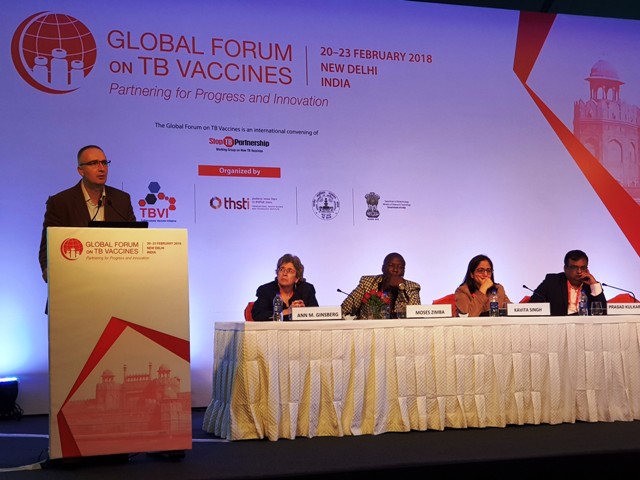Press release: Results from innovative tuberculosis vaccine trial show potential


Results from innovative tuberculosis vaccine trial show potential for new BCG revaccination strategies and hope for subunit vaccines.
This is the first “prevention-of-infection” trial conducted for tuberculosis, the world’s leading infectious disease killer.
NEW DELHI, 19 FEBRUARY 2018 - Scientists from the University of Cape Town-based South African Tuberculosis Vaccine Initiative (SATVI) and the Desmond Tutu HIV Foundation have presented the findings of an innovative clinical trial that provides encouraging new evidence that TB vaccines could prevent sustained TB infections in high-risk adolescents. The results were presented at the 5th Global Forum on TB Vaccines in New Delhi, India 20-23 February 2018.
According to the World Health Organization (WHO), about one-quarter of the world's population has what is called a latent TB infection, which means people have been infected by TB bacteria but are not ill with the disease and cannot transmit the disease. People infected with TB bacteria have a lifetime risk of falling ill with TB of 10%.
In a prevention-of-infection phase 2 trial conducted in Worcester and Cape Town, South Africa, revaccination with the Bacille Calmette-Guerin (BCG) vaccine significantly reduced sustained TB infections in adolescents. An experimental vaccine candidate, H4:IC31, also appeared to reduce sustained infections, although not at statistically significant levels. However, the trend observed for H4:IC31 is the first time a subunit vaccine has shown any indication of ability to protect against TB infection or disease in humans.
TB infections that developed during the study were measured using a QuantiFERON®-TB Gold in Tube (QFT-GIT) test, a commercially available blood test that helps diagnose TB infections. In the trial, individuals who tested negative for QFT-GIT were considered to not have a TB infection. The trial measured the rate by which individuals converted to QFT-GIT positive, interpreted as evidence of TB infection. Those individuals who tested QFT-GIT positive consecutively over 6 months were considered to have a sustained infection.
H4:IC31 is a subunit TB vaccine candidate being developed jointly by Aeras and Sanofi Pasteur, and the Statens Serum Institut. BCG is the only licensed tuberculosis vaccine available globally. The clinical trial was conducted at SATVI and at the Emavundleni Research Centre (part of the Desmond Tutu HIV Centre). The trial was funded by Sanofi Pasteur, the United Kingdom’s Department for International Development, and Aeras. The study was approved by the Medicines Control Council of South Africa and the independent ethics committee of the University of Cape Town.
Mark Hatherill, MD, Director of the South African Tuberculosis Vaccine Initiative (SATVI) at the University of Cape Town, and the study’s principal investigator, said: “We are very pleased to report the results of the first randomized, placebo-controlled prevention-of-infection trial for TB, which showed that vaccination may reduce the rate of sustained TB infection in a high-transmission setting. While neither vaccine proved to be statistically significant in preventing an initial TB infection, we are extremely encouraged by the efficacy findings against sustained TB infections. We believe the results from this novel trial design will provide significant scientific benefit to the field in understanding TB infection, and based on this positive signal, we look forward to testing the potential of such vaccines to prevent TB disease among uninfected adolescents in a larger, more traditional prevention-of-disease clinical trial.”
Tom Scriba, PhD, Deputy Director Immunology of SATVI, said “We are excited that this result provides an opportunity to identify the immune response that protects against sustained TB infection. This advance would accelerate rational development of new TB vaccines.”
Linda-Gail Bekker, MD, PhD, a lead investigator for the trial, the Chief Operating Officer at the Desmond Tutu HIV Foundation and President of the International AIDS Society, said: “We would like to thank all the study participants and their families for participating in this novel clinical trial. We believe the results are important and warrant further investigation into other subunit vaccines and a re-evaluation of BCG revaccination as a potential strategy to prevent TB in high-incidence countries. An effective TB vaccine remains an urgent global goal.”
Jacqui Shea, PhD, CEO of Aeras, stated: “New TB vaccines are essential to end this deadly epidemic, especially with the rise of drug-resistant strains. In this innovative study, we not only observed important results for BCG, we also saw the first early efficacy signal against infection to be shown by a subunit TB vaccine candidate (H4:IC31). Further, we established that the novel prevention-of-infection trial design has the potential to provide evidence of a biological signal earlier and at lower cost than traditionally designed TB vaccine prevention of disease efficacy studies. The data collected will inform the next series of clinical studies as well as enable the search for correlates of protection against sustained infection. Later this year, Aeras and its partners look forward to announcing primary results from a Phase 2b prevention of disease trial with M72/AS01E, another subunit vaccine candidate, and to commencing two Phase 2 clinical trials with an additional, promising subunit vaccine candidate.” www.aeras.org
Study Design and Results for H4:IC31 Vaccination and BCG Revaccination
The study involved 990 HIV-negative, healthy adolescents (12 to 17 years of age) who had been vaccinated as infants with BCG. All participants were randomized evenly into three study arms: placebo, H4:IC31, or BCG revaccination. All participants were screened to ensure they were not infected with Mycobacterium tuberculosis (Mtb) prior to vaccination in the study.
The data showed that both vaccines appeared to be safe and produced an immune response in the adolescents studied. No vaccine-related serious adverse events were reported in the study, and the most common vaccine-related adverse event was injection site swelling in BCG revaccinated participants, typical for BCG vaccination.
For the primary efficacy outcome, 134 participants tested positive for an initial Mtb infection as measured by QFT-GIT conversion from negative to positive. When compared to the placebo, neither vaccine prevented an initial Mtb infection (i.e., QFT-GIT conversion).
For the secondary efficacy outcome, 82 participants exhibited a sustained QFT-GIT conversion which remained positive for at least 6 months. In the BCG revaccination arm, the vaccine efficacy for preventing a sustained infection was 45.4% and was statistically significant. In the H4:IC31 arm, vaccine efficacy was 30.5%, but did not meet rigorous criteria for statistical significance.
This convincing BCG efficacy signal provides impetus for trials of BCG revaccination for prevention of TB disease in adolescents without Mtb infection, which would be needed to confirm direct clinical benefit of the prevention-of-infection approach. The modest efficacy effect of H4:IC31 encourages further testing of next generation subunit TB vaccines.